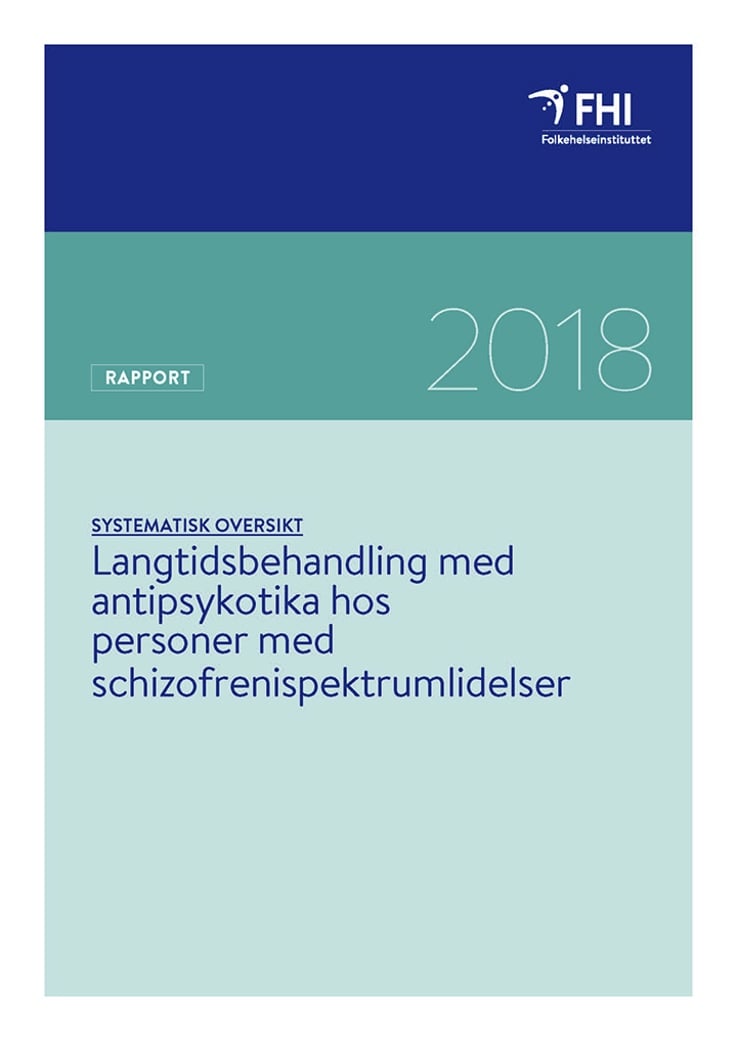Long-term antipsychotic treatment of persons with schizophrenia spectrum disorders: a systematic review
Systematic review
|Published
The objective for this systematic review is to summarize the effects and adverse effects of treatment for two years or longer with antipsychotics in patients with schizophrenia spectrum disorders.
Key message
Anti-psychotics is a group of drugs that are used to treat schizophrenia. Paired with psychosocial interventions, drug treatment with anti-psychotics is the standard treatment for schizophrenia. Randomized controlled trials have shown that anti-psychotics reduce the risk for new psychotic episodes for up to two years.
We have investigated the effects and adverse effects of using antipsychotics for two years or longer. We searched for high quality systematic reviews but found none that had included any relevant studies about long-term effects. We then searched for primary studies, and included eight studies on three patient samples from Finland, Sweden and the USA. The question about effects and adverse effects of long-term treatment (longer than two years) with antipsychotics is difficult to answer, even with the best research methods.
We, therefore, have very low confidence in the documentation. The mortality among patients who had used antipsychotics was lower than among patients who had not used antipsychotics. Patients without antipsychotics had better work functioning than patients who had used antipsychotics. Patients without antipsychotics also had less positive and negative symptoms. Risk of rehospitalisation varied according to type of drug, and the numbers were uncertain. We cannot determine whether there is a causal relation for any of the findings. Results about important outcomes such as parkinsonism and metabolic disorders are missing in the included studies.
Summary
Background
The Norwegian Institute of Public Health was asked by Vestre Viken Health Agency in September 2016 to provide a systematic review of the effects and side effects of long-term treatment with antipsychotics on schizophrenia. Antipsychotics is standard treatment for schizophrenia, and randomized controlled trials following patients up to two years have shown that the treatment dampens positive psychotic symptoms, reduces risk for relapse, increases quality of life and gives fewer readmissions. The current national Norwegian guideline opens up for maintenance treatment beyond two years. There is far less research that has investigated the effect of treatment for longer than two years.
Objective
To summarize the effects and adverse effects of treatment for two years or longer with antipsychotics in patients with schizophrenia spectrum disorders.
Method
We have searched nine electronic databases for systematic reviews of the effects of use of antipsychotics for two years or longer in people with diagnoses F20 and F22-F29 in ICD-10, and codes 295.40 Schizophreniform, 295.70 Schizoaffective, 295.90 Schizophrenia, 297.1 Delusional disorder, and 298.9 Unspecified SZ in DSM-5, called schizophrenia spectrum diagnoses. We have also searched for primary studies to obtain studies that were not included in systematic reviews. Finally, we have appraised articles that we received from peer reviewers. The included studies are quality rated using a checklist, and we assess our confidence in the results with GRADE.
Results
The search for systematic reviews gave 3987 hits, but we did not include any. A new search for primary studies gave 12640 hits and we included eight studies from three patient samples. The studies were described in one doctoral dissertation and seven journal articles. The studies were from Finland, Sweden and the United States. In the studies from Finnish and Swedish registries, mortality in patients who had used anti-psychotics was lower than in patients who had not used antipsychotics, but the absolute differences were small and we cannot determine if there is a causal link. In a US study, patients without antipsychotics were found to have better working performance than patients who had used antipsychotics for more than two years. Patients without antipsychotics had less positive and negative symptoms in this study. The risk of re-hospitalization varied among drugs, and the numbers were uncertain. Again we cannot determine if there is a causal link. Results of important outcomes such as parkinsonism and metabolic disturbances are missing in the included studies.
Discussion
No randomized controlled trials have been performed where the actual treatment time exceeded two years. However, register studies from Finland and Sweden that provide the ability to link information about diagnosis with the collection of prescriptions may potentially provide valuable support for clinical treatment guidelines. But the studies that have been performed provide weak support for a causal relation between use of antipsychotics and mortality. Neither can the small study from the USA determine a causal relation between work functioning and long-term use of antipsychotics.
Conclusion
The question about effects and adverse effects of long-term treatment (longer than two years) with antipsychotics is difficult to answer, even with the best research methods. We, therefore, have very low confidence in the documentation. Drug and mortality studies from national registries in Finland and Sweden found that patients who have used anti-psychotic drugs for a long time have lower mortality than patients who have not used anti-psychotics, but it is difficult to establish a causal relationship. A study from Chicago found that patients who had not used antipsychotics over a period of 20 years were more likely to working and had better work performance than patients who had used antipsychotics continuously during this period. However, the study is small and had a large dropout rate. Here too, it is difficult to establish a causal link.


